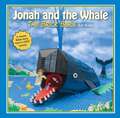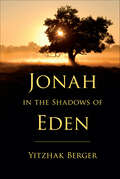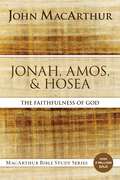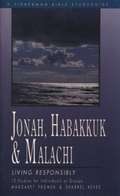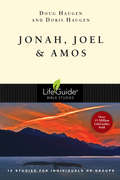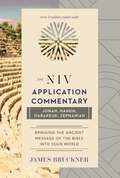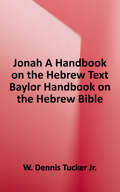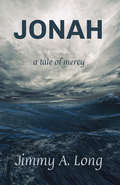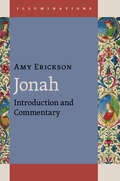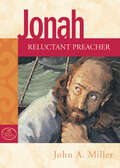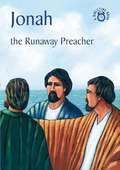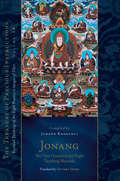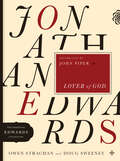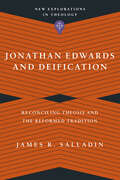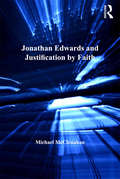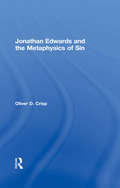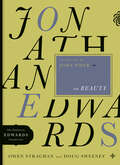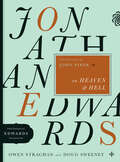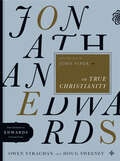- Table View
- List View
Jonah and the Whale: The Brick Bible for Kids (Brick Bible for Kids)
by Brendan Powell SmithJonah was a stubborn man. When God came to Jonah to preach repentance to the Ninevites, Jonah wasn't interested. After all, besides being known far and wide for their wickedness, Nineveh was also one of Israel's greatest enemies. So why should Jonah help them? Instead, Jonah decided to ignore God and run-but he didn't make it very far. While aboard a ship sailing away from Nineveh, God sent a terrible storm that threatened to sink the ship. The crew, knowing God was angry with Jonah for disobeying him, threw Jonah overboard. But instead of drowning, Jonah was swallowed by a great whale. Would Jonah repent and be saved, or face a perilous demise? Meticulously constructed LEGO dioramas bring to life the incredible story of faith and being swallowed alive. Enjoy reading one of the Bible's oddest stories illustrated with LEGO bricks as a family. This book is aimed at children ages 3 to 6 and could be read by first and second graders. The book will appeal to Christian and Jewish families and institutions as a way to teach this Bible story to younger children through a familiar toy medium. It will also appeal to LEGO fanatics who collect books about LEGO, as well as fans of the author's Brick Testament website.
Jonah in the Shadows of Eden (Biblical Literature)
by Yitzhak BergerYitzhak Berger advances a distinctive and markedly original interpretation of the biblical book of Jonah that resolves many of the ambiguities in the text. Berger contends that the Jonah text pulls from many inner-biblical connections, especially ones relating to the Garden of Eden. These connections provide a foundation for Berger's reading of the story, which attributes multiple layers of meaning to this carefully crafted biblical book. Focusing on Jonah's futile quest and his profoundly troubled response to God's view of the sins of humanity, Berger shows how the book paints Jonah as a pacifist no less than as a moralist.
Jonah, Amos, and Hosea: The Faithfulness of God (MacArthur Bible Studies)
by John F. MacArthurGod's faithfulness is on display throughout Scripture but is especially evident in the books of Jonah, Amos, and Hosea.Through the lives, examples, and messages of these three prophets, we see God&’s constant love and forgiveness for Jews and Gentiles alike in spite of blatant disobedience, spiritual adultery, inappropriate worship, and a lack of justice. In the twelve studies within, join John MacArthur to focus on these &“Minor Prophets&”—so called for their brevity rather than their importance. By working through this study, you will learn that in your life, just as in the lives of the people of Israel, God&’s faithfulness is unending—even when our faithlessness is constant.—ABOUT THE SERIES—The MacArthur Bible Study series is designed to help you study the Word of God with guidance from widely respected pastor and author John MacArthur. Each guide provides intriguing examinations of the whole of Scripture by examining its parts and incorporates:Extensive, but straight-forward commentary on the text.Detailed observations on overriding themes, timelines, history, and context.Word and phrase studies to help you unlock the broader meaning and apply it to your life.Probing, interactive questions with plenty of space to write down your response and thoughts.
Jonah, Habakkuk, and Malachi: Living Responsibly (Fisherman Bible Studyguide Series)
by Sharrel Keyes Margaret Margaret FromerHave you ever been troubled about the relationship between God's love and his justice? How should a Christian's lifestyle relate to the people around him? How do we deal with the realization that God's perspective and ours do not agree? Jonah, Habakkuk, and Malachi encountered many confusing questions and issues. And just as God confronted them, he brings us face to face with the holiness of his character, the breadth of his perspective and love, and the kind of responsible living he desires for his people.
Jonah, Joel and Amos: Seek The Lord And Live! (LifeGuide Bible Studies)
by Doug HaugenIn today's world it's easy to wander away from God. Hectic schedules and the quest for success often mean that time with God gets neglected. But if you slow down long enough to listen, the minor prophets can have a major impact on the quality of your life. These twelve session LifeGuide Bible Study in Jonah, Joel and Amos, written by Doug and Doris Haugen, will help you focus on your number one priority--to seek the Lord and live! This revised LifeGuide Bible Study features additional questions for starting group discussions and for meeting God in personal reflection, together with expanded leader's notes and a "Now or Later" section in each study. For over three decades LifeGuide Bible Studies have provided solid biblical content and raised thought-provoking questions—making for a one-of-a-kind Bible study experience for individuals and groups. This series has more than 130 titles on Old and New Testament books, character studies, and topical studies. PDF download with a single-user license; available from InterVarsity Press and other resellers.
Jonah, Nahum, Habakkuk, Zephaniah (The NIV Application Commentary)
by James BrucknerThe NIV Application Commentary helps you communicate and apply biblical text effectively in today's context.To bring the ancient messages of the Bible into today's world, each passage is treated in three sections:Original Meaning. Concise exegesis to help readers understand the original meaning of the biblical text in its historical, literary, and cultural context.Bridging Contexts. A bridge between the world of the Bible and the world of today, built by discerning what is timeless in the timely pages of the Bible.Contemporary Significance. This section identifies comparable situations to those faced in the Bible and explores relevant application of the biblical messages. The author alerts the readers of problems they may encounter when seeking to apply the passage and helps them think through the issues involved.This unique, award-winning commentary is the ideal resource for today's preachers, teachers, and serious students of the Bible, giving them the tools, ideas, and insights they need to communicate God's Word with the same powerful impact it had when it was first written.
Jonah: A Handbook on the Hebrew Text (Baylor Handbook on the Hebrew Bible Ser.)
by W. Dennis TuckerIn the Baylor Handbook on the Hebrew Bible's most widely used volume, Dennis Tucker provides a foundational analysis of the text of Jonah. This second edition of Jonah is distinguished by the detailed and comprehensive attention paid to the Hebrew text. Tucker's analysis is a convenient pedagogical and reference tool that explains the form and syntax of the biblical text, offers guidance for deciding between competing semantic analyses, engages important text-critical debates, and addresses questions relating to the Hebrew text that are not always addressed in standard commentaries. Beyond serving as a succinct and accessible analytic key, Jonah also reflects the most up-to-date advances in scholarship on Hebrew grammar and linguistics--specifically, this edition relies on the methodology of generative grammar utilized in other recent volumes in this series. This handbook proves itself an indispensable tool for anyone committed to a deep reading of the Hebrew biblical text.
Jonah: A Tale of Mercy
by Jimmy A. LongThe story of Jonah is ancient and often told, but even so, most remember it only as the tale of a prophet eaten by a fish. In Jonah: A Story of Mercy, author Jimmy A. Long presents the biblical story of Jonah with historical details of the time while weaving fictional characters and events that present the prophet as a real man fighting the call of God on his life. Beginning prior to his call to Nineveh, we follow Jonah as he runs from God, reluctantly obeys God, and is amazed and even angered at the mercy of God. In the process, we learn as much about ourselves as we do the prophet.
Jonah: Introduction and Commentary (Illuminations)
by Amy EricksonThe dominant reading of the book of Jonah—that the hapless prophet Jonah is a lesson in not trying to run away from God—oversimplifies a profoundly literary biblical text, argues Amy Erickson. Likewise, the more recent understanding of Jonah as satire is problematic in its own right, laden as it is with anti-Jewish undertones and the superimposition of a Christian worldview onto a Jewish text. How can we move away from these stale interpretations to recover the richness of meaning that belongs to this short but noteworthy book of the Bible? This Illuminations commentary delves into Jonah&’s reception history in Christian, Jewish, and Islamic contexts while also exploring its representations in visual arts, music, literature, and pop culture. After this thorough contextualization, Erickson provides a fresh translation and exegesis, paving the way for pastors and scholars to read and utilize the book of Jonah as the provocative, richly allusive, and theologically robust text that it is.
Jonah: Reluctant Preacher (God's People)
by John A MillerWho was Jonah in the Bible? What is the book of Jonah about?Jonah was an ordinary person with extraordinary talents. He was God’s only choice for a rare and dangerous mission. The mission: Share the Word of God and his enduring promises to the Assyrian people of Nineveh—enemies of Jonah’s people.Like so many of God’s people today, Jonah resisted the mission and exposed his heart of arrogance, stubbornness, and doubt. Jonah’s story needs retelling today. Sometimes, God’s reluctant messengers need divine rescue every bit as much as the people to whom God has sent them.If you’re wondering who Jonah was, or want to know how Jonah’s faith journey impacts your own, this book is for you!Jonah is part of the God’s People series by Northwestern Publishing House. It’s a wonderful collection about the lives and times of some of God’s chosen people. Plots and settings have been taken directly from the Bible, and each book features beautifully detailed, full-color illustrations.
Jonah: The Runaway Preacher
by Carine MackenzieThe story of Jonah is accurately retold from the Bible (From the book of Jonah). The Bibletime series by Carine Mackenzie have been praised for their accurate retelling of great bible stories. This timeless collection has been printed in many languages throughout the world and sold in their millions. They can be read over and over again.
Jonang: The One Hundred and Eight Teaching Manuals (The Treasury of Precious Instructions)
by Jamgon KongtrulJamgön Kongtrul Lodrö Taye presents practical teachings from a variety of Tibetan Buddhist traditions in this volume of The Treasury of Precious Instructions.The Treasury of Precious Instructions by Jamgön Kongtrul Lodrö Taye, one of Tibet's greatest Buddhist masters, is a shining jewel of Tibetan literature, presenting essential teachings from the entire spectrum of practice lineages that existed in Tibet. In its eighteen volumes, Kongtrul brings together some of the most important texts on key topics of Buddhist thought and practice as well as authoring significant new sections of his own.In this, the eighteenth volume, Kongtrul expands on The One Hundred and Eight Guidebooks, a collection of teaching manuals compiled by the sixteenth-century Tibetan master Kunga Drolchok, adding Indic source texts, Tibetan antecedents, and later interpretations. Though compiled by a Jonangpa abbot and transmitted by the Jonang tradition, these teaching manuals are actually drawn from the Kadam, Sakya, Kagyu, and, to a lesser extent, Nyingma traditions. They are succinct and impart practical wisdom, as transmitted by key figures like Kunga Chogdrub and Lowo Khenchen Sonam Lhundrub. Gyurme Dorje, the translator, provides extensive notes and helpful context throughout. The resulting volume preserves and integrates the diverse lineages of Tibetan Buddhism while providing useful advice to practitioners.
Jonathan Edwards Lover of God (The Essential Edwards Collection #1)
by Owen Strachan Douglas Allen SweeneyJonathan Edwards stands tall in America&’s historical memory. A great philosopher, a great preacher, a great theologian. Edwards was a complex and gifted person, one who defies easy characterization. He intimidates us, and we distance ourselves from him because at the most fundamental level, he&’s just not like us.It is of course true that Jonathan Edwards was a combination of many rare things: an exceptional intellectual, a masterly preacher, a cavernous theologian, a devoted husband and father, a college president, and much more. But all of these roles flowed out of one simple and essential reality: Jonathan Edwards was a Christian. He was a believer who followed Jesus Christ in repentant faith. He loved God, and he sought to live for Him.This book celebrates the unique life and ministry of Jonathan Edwards. It peels back the cover of his life, to show us what a life devoted to our sovereign Lord can look like. It causes us to use our own God-given gifts for the salvation of sinners, the strengthening of God&’s church, and the glory of God. You do not need to be a scholar to enjoy and benefit from the story and rich lessons about Edwards' life.
Jonathan Edwards Lover of God (The Essential Edwards Collection #1)
by Owen Strachan Douglas Allen SweeneyJonathan Edwards stands tall in America&’s historical memory. A great philosopher, a great preacher, a great theologian. Edwards was a complex and gifted person, one who defies easy characterization. He intimidates us, and we distance ourselves from him because at the most fundamental level, he&’s just not like us.It is of course true that Jonathan Edwards was a combination of many rare things: an exceptional intellectual, a masterly preacher, a cavernous theologian, a devoted husband and father, a college president, and much more. But all of these roles flowed out of one simple and essential reality: Jonathan Edwards was a Christian. He was a believer who followed Jesus Christ in repentant faith. He loved God, and he sought to live for Him.This book celebrates the unique life and ministry of Jonathan Edwards. It peels back the cover of his life, to show us what a life devoted to our sovereign Lord can look like. It causes us to use our own God-given gifts for the salvation of sinners, the strengthening of God&’s church, and the glory of God. You do not need to be a scholar to enjoy and benefit from the story and rich lessons about Edwards' life.
Jonathan Edwards and Deification: Reconciling Theosis and the Reformed Tradition (New Explorations in Theology)
by James R. SalladinThe doctrine of deification or theosis is typically associated with the Eastern Orthodox tradition. Indeed, the language of participation in the divine nature as a way to understand salvation often sounds like strange music in the ears of Western Christians despite passages like 2 Peter 1:4 where it appears. However, recent scholarship has argued that the theologies of some of the most prominent figures in the history of the Western church, including Martin Luther, John Calvin, and John Wesley, share more in common with deification than has been acknowledged. In this volume of IVP Academic's New Explorations in Theology series, theologian James Salladin considers the role of deification in the theology of another well-known Western theologian: Jonathan Edwards. In addition, he reflects upon the question of how Edwards's soteriology compares with the rest of the broader Reformed tradition. Here, we discover how Edwards's theology affirms what it means for sinners to be brought into the hands of a loving God.
Jonathan Edwards and Justification by Faith
by Michael McClenahanJonathan Edwards (1703-1758) is widely regarded as North America's most influential theologian. Throughout the early decades of his ministry he engaged in a public and sustained debate with 'Arminian' theology, a crusade that contributed significantly to the events of the Great Awakening. This book investigates the contours and substance of this theological war. In establishing a clearer historical context for this polemic, McClenahan seeks to overturn the scholarly consensus that Edwards' own theology was a twisting of the Reformed tradition. By demonstrating that Edwards' interlocutor was the dead English Archbishop, John Tillotson, McClenahan provides the hermeneutical key for many of Edwards' most significant works. Justification by faith is one of the most contested doctrines in contemporary theology and Jonathan Edwards, referred to as America's Augustine, wrote extensively on this area. His is a voice that many people are keen to hear.
Jonathan Edwards and the Metaphysics of Sin
by Oliver D. CrispJonathan Edwards (1703-1758) is widely regarded as America's greatest philosopher-theologian. In the last half century there has been a resurgence of interest in Edwards' work from historians, theologians and philosophers, aided by the publication of the Yale edition of Edwards' Works. Edwards' thinking on sin has long been a mystery to scholars trying to fit his thought into the traditional categories of Reformed theology. What this study shows is that Edwards' theory of sin was an original contribution to philosophical theology, which can only be understood when read on its own terms as a philosophical theory about the nature of sin, its origin and transmission. This constitutes a substantial contribution to the literature on Edwards and, more broadly, to philosophical theology in general.
Jonathan Edwards on Beauty (The Essential Edwards Collection #2)
by Owen Strachan Douglas Allen SweeneyBeauty is hard to describe, but easy to identify. It resides in expected and unexpected places in our world. Beauty is present in our world in a variety of forms. Yet while the average person might think about the reality of beauty from time to time, few people would think about the source of beauty. Where does beauty come from? Why is it here?Several hundred years ago Jonathan Edwards did some thinking of his own on this difficult subject. This volume explores his meditation on the subject and lays out a Christian framework for understanding and experiencing the beauty God has planted in His world.Edwards found in the study of beauty the person of God. Where Edwards saw beautiful images and acts, he saw a representation, a small picture, of a reality too great to comprehend, a God too majestic to adequately adore. He sets in motion a path of glory that begins with the Lord, moves to creation, continues to the incarnation of Christ, moves to the church, and ascends to the glory of heaven, where the Holy Trinity dwells.Easily accessible and readable, you do not need to be a scholar to enjoy these insights about Jonathan Edwards and his writings.
Jonathan Edwards on Beauty (The Essential Edwards Collection #2)
by Owen Strachan Douglas Allen SweeneyBeauty is hard to describe, but easy to identify. It resides in expected and unexpected places in our world. Beauty is present in our world in a variety of forms. Yet while the average person might think about the reality of beauty from time to time, few people would think about the source of beauty. Where does beauty come from? Why is it here?Several hundred years ago Jonathan Edwards did some thinking of his own on this difficult subject. This volume explores his meditation on the subject and lays out a Christian framework for understanding and experiencing the beauty God has planted in His world.Edwards found in the study of beauty the person of God. Where Edwards saw beautiful images and acts, he saw a representation, a small picture, of a reality too great to comprehend, a God too majestic to adequately adore. He sets in motion a path of glory that begins with the Lord, moves to creation, continues to the incarnation of Christ, moves to the church, and ascends to the glory of heaven, where the Holy Trinity dwells.Easily accessible and readable, you do not need to be a scholar to enjoy these insights about Jonathan Edwards and his writings.
Jonathan Edwards on Heaven and Hell (The Essential Edwards Collection #5)
by Owen Strachan Douglas Allen SweeneyThe question of the afterlife is, for many today, one of preference. Christians trained to evangelize unsaved people with the query, &“If you were to die today, do you know where you would go – heaven or hell?&” have grown befuddled when met with the response, &“I don&’t believe in heaven or hell.&” Something in our culture has changed. The ground has shifted beneath our feet. We did not feel it. But change has come, just the same.We must reacquaint modern Christians with the eschatologically driven preaching and teaching of Edwards. This word &“eschatological&” may trip some readers up at first encounter, but it refers simply to &“last things&”, things of eternity and ultimate significance. We exhume Edwards' scripturally fired material on the reality of the afterlife, the terror of hell, the glories of heaven, and the shape life must take in light of these realities.If we accept the Word as our authority, and if we will allow Edwards to serve as our faithful and imaginative guide, we will find that God is alive. He is Lord of heaven and earth, the sovereign ruler of all Creation. He is not small. He can be found. He is not silent on the afterlife, and His testimony calls for our attention, our concern, and our whole-hearted worship and trust.Easily accessible and readable, you do not need to be a scholar to enjoy these insights about Jonathan Edwards and his writings.
Jonathan Edwards on Heaven and Hell (The Essential Edwards Collection #5)
by Owen Strachan Douglas Allen SweeneyThe question of the afterlife is, for many today, one of preference. Christians trained to evangelize unsaved people with the query, &“If you were to die today, do you know where you would go – heaven or hell?&” have grown befuddled when met with the response, &“I don&’t believe in heaven or hell.&” Something in our culture has changed. The ground has shifted beneath our feet. We did not feel it. But change has come, just the same.We must reacquaint modern Christians with the eschatologically driven preaching and teaching of Edwards. This word &“eschatological&” may trip some readers up at first encounter, but it refers simply to &“last things&”, things of eternity and ultimate significance. We exhume Edwards' scripturally fired material on the reality of the afterlife, the terror of hell, the glories of heaven, and the shape life must take in light of these realities.If we accept the Word as our authority, and if we will allow Edwards to serve as our faithful and imaginative guide, we will find that God is alive. He is Lord of heaven and earth, the sovereign ruler of all Creation. He is not small. He can be found. He is not silent on the afterlife, and His testimony calls for our attention, our concern, and our whole-hearted worship and trust.Easily accessible and readable, you do not need to be a scholar to enjoy these insights about Jonathan Edwards and his writings.
Jonathan Edwards on True Christianity (The Essential Edwards Collection #4)
by Owen Strachan Douglas Allen SweeneyWhat is a true Christian? What is the church? Though these are fundamental questions they often go unanswered in our current evangelical context. Far too many pastors and thinkers celebrate the trappings of faith and the mere benefits of Christianity, ignoring the biblical testimony on true conversion that shouts from countless texts from Scripture.This has fed an age-old problem: nominal Christianity. Though Edwards is sometimes presented as a scourge, a mean-hearted parson who lived to belt out thunderous damnations, a careful study of the historical record and of Edwards&’ writings shows that he was in fact a Christian man devoted to the cultivation of true and saving faith in a spiritually fickle people he tenaciously loved.The problem of noncommittal Christianity did not end with Edwards. It not only survives but thrives in the current day. In studying it then, we are studying ourselves. We see that nominal Christianity, a considerable challenge today, has historic roots. We need not face this problem alone, growing more discouraged by the day, flailing as we try method after method to address the problem. Instead, we can find solace, instruction, and encouragement from the biblically saturated life and ministry of Jonathan Edwards.Easily accessible and readable, you do not need to be a scholar to enjoy these insights about Jonathan Edwards and his writings.
Jonathan Edwards on True Christianity (The Essential Edwards Collection #4)
by Owen Strachan Douglas Allen SweeneyWhat is a true Christian? What is the church? Though these are fundamental questions they often go unanswered in our current evangelical context. Far too many pastors and thinkers celebrate the trappings of faith and the mere benefits of Christianity, ignoring the biblical testimony on true conversion that shouts from countless texts from Scripture.This has fed an age-old problem: nominal Christianity. Though Edwards is sometimes presented as a scourge, a mean-hearted parson who lived to belt out thunderous damnations, a careful study of the historical record and of Edwards&’ writings shows that he was in fact a Christian man devoted to the cultivation of true and saving faith in a spiritually fickle people he tenaciously loved.The problem of noncommittal Christianity did not end with Edwards. It not only survives but thrives in the current day. In studying it then, we are studying ourselves. We see that nominal Christianity, a considerable challenge today, has historic roots. We need not face this problem alone, growing more discouraged by the day, flailing as we try method after method to address the problem. Instead, we can find solace, instruction, and encouragement from the biblically saturated life and ministry of Jonathan Edwards.Easily accessible and readable, you do not need to be a scholar to enjoy these insights about Jonathan Edwards and his writings.
